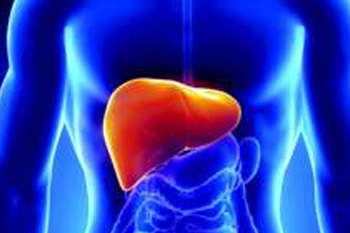MedStar Health's Center for Liver and Pancreas Surgery is one of the largest liver transplant centers in the region, with 106 transplants a year. Patients on our waitlist receive transplants faster than any other center in MD and Washington, D.C., nearly three times as fast as other transplant centers. Our commitment to our patients translates to excellent outcomes that exceed the national average.
The liver is one of the largest and most complex organs in the body. It weighs about three pounds in adults, and is a spongy mass of wedge-shaped lobes. The liver has numerous functions that are necessary for life, including:
-
Processing carbohydrates, fats, and proteins
-
Storing vitamins
-
Processing nutrients absorbed from food
-
Manufacturing factors needed for metabolism and other bodily functions
-
Secreting bile to digest fats
-
Breaking down toxic substances in the blood
-
Itching: bile does not drain appropriately, so left over bile salts can lead to itching
-
Fatigue: liver can no longer convert nutrients or store vitamins, leaving your energy level low
-
Fluid retention: the diseased liver cannot use protein in the body, leading to fluid buildup
-
Bleeding problems: the diseased liver cannot make the materials needed for blood clotting

-
Autoimmune hepatitis
-
Fatty liver disease (NASH)
Different types of liver disease are treated in different ways. Critical to managing liver disease and perhaps even regenerating new, healthy liver cells, is a healthy diet that supports healthy liver function. However, if your liver is damaged to the point where regeneration is not an option, the best treatment for some types of end-stage liver disease is transplantation.
Critical to managing liver disease and perhaps even regenerating new, healthy liver cells, is a healthy diet that supports healthy liver function. The Liver Transplant Program offers a nutritionist who has expertise in designing a diet for those with liver disease. However, if your liver is damaged to the point where regeneration is not an option, also known as end-stage liver disease, your doctor may recommend a transplant.
Our liver transplant team members are dedicated to supporting liver transplant patients, from their first steps in their journey toward transplantation, to managing their healthy organ for life.
-
Innovation: Our surgeons have pioneered new techniques in liver transplantation, including split-liver transplants, where one liver is divided and transplanted into two recipients
-
Teamwork: Our staff displays remarkable teamwork and offers patients the best possible care from a transplant team made up of a variety of healthcare professionals
-
Availability: A transplant surgeon is on call 24 hours a day, seven days a week to evaluate organs for potential transplantation
Tumors in the liver may occur because of health conditions such as hepatitis, or they can be a result of problems in other organs. Sometimes, tumors such as colon cancer metastasize to the liver.
It is typically best for tumors in the liver to be removed, although sometimes we can determine that they are not harmful without operating. In these cases, we can observe them over time to make sure they are not causing further damage.
The MedStar Health Liver Tumor program is the only true multidisciplinary one of its kind in the Washington, D.C., metropolitan area, and one of the most experienced anywhere. Patients who have a growth in the liver are evaluated by a team of medical liver specialists, interventional radiologists, surgeons, oncologists, gastroenterologists, nurse coordinators and others as needed. The thorough evaluation by specialists in the field makes the difficult diagnosis of liver tumors optimal.
Liver tumor treatment
Many therapies are available for liver tumors; treatment will depend on the type of lesion and the patient’s condition. We will individualize your care based on these factors. Treatments such as microwave treatment, freezing, radiofrequency ablation, medications, chemoembolization, or surgical removal are all considered. After an evaluation in the office, our team consults together to determine the best therapy for you, then discusses the decision with you and your doctors. You then make the final decision to move forward with your team.
Depending on the size of the tumor, your surgeon will likely opt to remove the tumor and a portion of the liver. In other cases, your hepatologist and surgeon may recommend a liver transplant.
A variety of liver conditions can require surgery or a liver transplant in young children. At MedStar Health, we have world-class hepatologists who specialize in treating children.
Pediatric liver diseases we treat include:
- Pediatric Hepatitis: Babies and children generally contract hepatitis through contact with contaminated diapers (hepatitis A) or from an infected mother during birth and delivery (hepatitis B). Metabolic diseases can also lead to hepatitis infections
- Biliary Atresia: Bile helps the body digest food and nutrients. In some babies, the tubes that deliver bile from the liver to the gallbladder do not develop properly. Defective tubes can cause blockages of built-up bile in the tubes, which can lead to complications like cirrhosis (severe liver scarring)
- Liver Tumors/Hepatoblastoma: Hepatoblastoma is a type of cancerous liver tumor that affects babies and children under age 3. It can cause cancer to spread to other organs including the lungs, stomach, or bone marrow
- Choledochal Cysts: Bile ducts deliver bile from the liver to the gallbladder. Some babies are born with bile ducts that never fully developed. As a result, bile can get stuck in the tubes and form choledochal cysts (lumps), which can cause jaundice or become infected and need to be removed with surgery
- Metabolic Liver Diseases: A wide variety of metabolic and genetic diseases can affect and damage the liver, including:
- Alpha-1 antitrypsin deficiency
- Wilson’s disease
- Neonatal hemochromatosis
- Glycogen storage disease type I
- Cystic fibrosis
- Crigler-Najjar Syndrome type I
Learn more about the Transplant Center for Children.
Our providers

Expert Gastroenterology Care
Getting the care you need starts with seeing one of our gastroenterologists.
Our locations
Distance from Change locationEnter your location
MedStar Georgetown University Hospital
3800 Reservoir Rd. NW Washington, DC, 20007
MedStar Washington Hospital Center
110 Irving St. NW Washington, DC 20010
MedStar Franklin Square Medical Center
9000 Franklin Square Dr. Baltimore, MD 21237
MedStar Georgetown Transplant Institute at Fairfax
3020 Hamaker Court Suite 501 Fairfax, Virginia 22031
MedStar Georgetown Transplant Institute at Frederick
163 Thomas Johnson Dr. Unit E Frederick, MD 21702






























